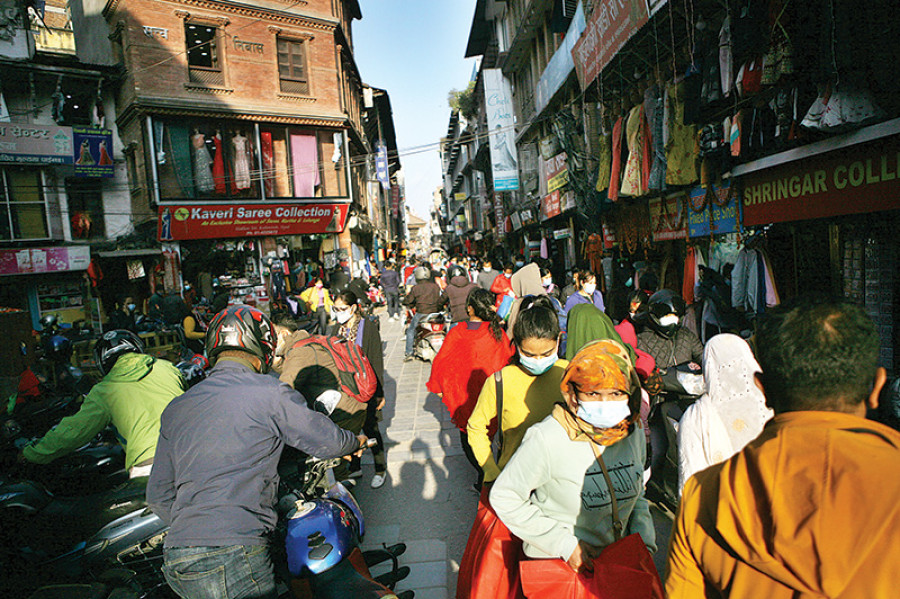Valley
Mayors’ forum calls for stringent action to break Covid-19 transmission chain in the Valley
Virologists suggest two ways to contain the pandemic: conscious public behaviour and government measures.
Anup Ojha
With the major festive season over, mayors of Kathmandu Valley have renewed their concern over coronavirus cases that are rising yet again, suggesting that the government take stringent measures to break the chain of Covid-19 transmission.
Two months ago, the forum of mayors of the 17 municipalities in the Valley, had asked the federal and provincial governments to control the arrival of people in the Valley through major entry points even by deploying the army if needed during the festive season when public movement is high.
In the second week of September, the forum had suggested the government not ease the prohibitory orders imposed in the Valley for three weeks by the district administration offices, but their concerns were not addressed.
“Now it’s inevitable to break the chain of Covid-19, and we have put forth our demands to the government for making a wise decision to save Kathmandu Valley and its people,” said Madhyapur Thimi Mayor Madan Sundar Shrestha, also the secretary of the Kathmandu Valley Mayors’ Forum, after attending a meeting of the Corona Crisis Management Centre on Tuesday.
The meeting has decided to study the infection data of 21 days after Chhath and take necessary steps to contain Covid-19, possibly by reimposing the restrictions, said Shrestha.
The meeting was attended by Deputy Prime Minister Ishwar Pokhrel, Home Minister Ram Bahadur Thapa, Health Minister Bhanu Bhakta Dhakal, Tourism Minister Yogesh Bhattarai, Foreign Minister Pradeep Gyawali, Minister for Physical Infrastructure and Transport Basanta Kumar Nembang, among other ministers and government secretaries.
Kathmandu Valley has become a new hotspot of the Covid contagion as officials and the people have not taken necessary precautions, observers say. Government records show that nearly 60 percent of the positive cases nationwide are from the Valley and health officials suspect that the proportion of cases has increased in the Valley in the festive season when it saw high mobility especially at marketplaces.
Dr Sher Bahadur Pun, virologist at Sukraraj Tropical and Infectious Disease Hospital, Teku, suspects that the winter season might exacerbate the virus situation.
“There are only two means by which we can contain the virus in the Valley. One is that people should be aware, and the government should act firmly in controlling the spread of the virus,” said Pun. Should restrictions be imposed again, they must be stringent, unlike in earlier times when little else was done in strategic preparations other than keeping people indoors, he added.
According to the Health Ministry 1,790 new cases of Covid-19 were reported on Tuesday with 24 deaths across the country. Till date, a total of 224,078 people have been infected with the virus. Kathmandu Valley recorded 947 new infections—692 in Kathmandu, 190 in Lalitpur and 65 in Bhaktapur.
“This is a bleak situation. The number of deaths has increased, and everyone should be serious about it,” said Pun.
The number of confirmed cases in the Valley has reached 104,682, up from 81,068 as of November 3.
Lalitpur Mayor Chiribabu Maharjan, who didn’t take part in Tuesday's crisis management centre meeting, blamed the central and federal governments for the present spike in Covid-19 cases in Kathmandu Valley.
“We had suggested the government make a comprehensive strategic plan and put in place restrictions in the Valley. We had also suggested closing all the entry points to the Valley. The government didn’t, and we are facing this difficult situation now,” said Maharjan.
“Now there is a possibility of the government announcing another round of restrictions but it should not announce lockdown or restrictions without proper coordination between the central, federal and local governments.”
He said the government should work to a goal, and implement its strategy for a visible outcome. “We are ready to coordinate with all tiers of government to contain the virus because our future depends on how we can handle the virus,” said Maharjan.




 9.7°C Kathmandu
9.7°C Kathmandu.jpg)














